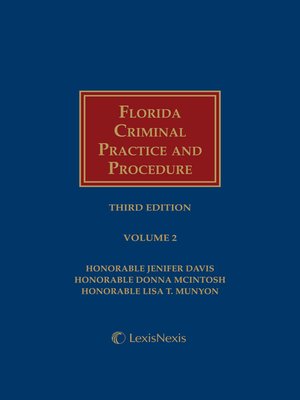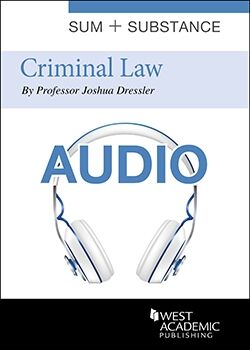Criminal Law Field Placement Clinic Resource Guide
Florida Rules of Criminal Procedure
The Florida Rules of Criminal Procedure are the governing body of rules for Florida criminal courts. Each chapter outlines procedural rules the courts and counsel must follow to "provide for the just determination of every criminal proceeding." Fla. R. Crim. P. 3.020. These rules are the determining factor for any procedural issues that may arise.
Suggested Use: Use the annotated Rules linked below as a reference to find the governing section of rules for any procedural question. These include procedural deadlines, considerations at pre-trial hearings and trial, responsibilities of all parties, and any other issue regarding judicial processing.
-
Florida Rules of Criminal Procedure (Westlaw)Westlaw's annotated Florida Rules of Criminal Procedure. When you find a relevant rule related to your procedural issue, click the selected rule and use the "Notes of Decisions" tab located at the top of the rule page to access relevant case law.
-
Florida Rules of Criminal Procedure (Lexis)Lexis Nexis' Annotated Florida Rules of Criminal Procedure. When you find a relevant rule related to your procedural issue, click the selected rule. On the left hand side of the rule page, appears a page outline that begins with "Top of Document." From that outline, select "Notes to Decisions" to quickly jump to the bottom of the page to display relevant case law related to the selected rule.
-
LexisNexis Practice Guide: Florida Criminal Law (Lexis)This text provides step-by-step guidance on the many procedural issues and topics relevant to Florida criminal practice and quickly points you to LexisNexis resources that help you build your case. With its concise writing style, streamlined chapter format, abundance of checklists and forms, multitude of references to leading and related cases, cross references to relevant analytical content, and extensive and authoritative guidance from a consultative board of experienced Florida practitioners and judges, you'll find more of everything that makes a practice guide valuable and easy for you to use.
-
Florida Jurisprudence 2d. Criminal Law - Procedure (Westlaw)For assistance understanding the Florida Criminal Rules of Procedure, this secondary source and legal encyclopedia is a recommended tool for students to use for a more broad understanding of Florida's criminal procedure concepts.
South Florida Tri-County Local Rules (Unannotated):
Florida Criminal Practice and Procedure: Volumes 1 and 2
Florida Criminal Practice and Procedure provides a complete, easy-to-use, comprehensive analysis of all stages and aspects of criminal procedure in Florida courts, from arrest to appeal. In addition, it contains cites to controlling statutes and cases and provides practical advice and strategy on conducting effective counsel. These volumes give you detailed discussion of the basic law concerning: arrest, pre-trial release, indictments and information, discovery, motions, jury matters, argument, jury instruction, and verdicts. The eBook version of this title features links to Lexis Advance for further legal research options.
Suggested Use: If you spot a potential procedural issue in your case, use the title's Table of Contents or Index to find the chapter and subsection most closely related to your issue. This tile can provide a breakdown of understanding the legal issue, as well as provide you with Florida case law and statutes to support any argument that may arise.
For Example: Suppose opposing counsel refuses to produce a piece of discovery you believe integral to your case. Browse the Table of Contents to find Chapter 6. Discovery > Part B. Discovery Obligations of State and Defendant. Then, browse the chapter to determine whether your issue has merit and should be addressed or if your issue is moot.
-
Florida Criminal Practice and Procedure: Volume 1 by Russell E. Crawford
Call Number: Available via Lexis DigitalPublication Date: 12/21/2021 -
 Florida Criminal Practice and Procedure: Volume 2
by
Russell E. Crawford
Call Number: Available via Lexis DigitalPublication Date: 12/21/2021
Florida Criminal Practice and Procedure: Volume 2
by
Russell E. Crawford
Call Number: Available via Lexis DigitalPublication Date: 12/21/2021
Crim. Pro. Outlines
-
Abramson's Principles of Investigative Criminal Procedure by Leslie Abramson
Call Number: Available via West Academic.Publication Date: 01-10-2022For law students of constitutional criminal procedure, Principles of Investigative Criminal Procedure will assist them in learning about Fourth, Fifth, and Sixth Amendment issues associated with criminal investigations. This volume is an effort to provide a comprehensive, though “Concise”, treatise for law students and attorneys. The materials discuss and analyze the criminal procedure jurisprudence of the United States Supreme Court, with extensive use of primary source material that affects judges, prosecutors, defense counsel, and criminal defendants. Discussions relate to breakthrough decisions like Miranda v. Arizona, as well as cases adding a nuance to topics already well-developed in prior Court decisions. -
Black Letter Outline on Basic Criminal Procedure by Stephen Saltzburg; Daniel Capra; Angela Davis
Call Number: Available via West AcademicPublication Date: 2021-01-28Basic Criminal Procedure is a clear and comprehensive outline of the most important principles and issues taught in the basic Criminal Procedure law school course. It covers the 4th, 5th, and 6th Amendments, including Exceptions to the Warrant requirement, Remedies for 4th Amendment violations, the Privilege Against Self-Incrimination, Limits on Identification Evidence and the Right to Counsel. -
Black Letter Outline on Criminal Law by Joshua Dressler
Call Number: Available via West AcademicPublication Date: 2019-05-20Black Letter Outlines are designed to help a law student recognize and understand the basic principles and issues of law covered in a law school course. Black Letter Outlines can be used both as a study aid when preparing for classes and as a review of the subject matter when studying for an examination. Each Black Letter Outline is written by experienced law school professors who are recognized national authorities in their subject area.
Audiobooks
-
 Sum and Substance on Criminal Procedure (Audio Book)
by
Joshua Dressler
Publication Date: 2022This audio lecture covers the most important issues raised in a constitutional criminal procedure course relating to police practices. The lecture focuses on the Fourth, Fifth, Sixth, and Fourteenth Amendments and covers many issues, such as the meanings of the Fourth Amendment terms “search,” “seizure,” and “probable cause,” analysis of the exceptions to the search warrant requirement, and the doctrines of standing and the exclusionary rule. The lecture also covers police interrogation law as covered by the due process, self-incrimination, and right to counsel provisions of the Constitution, as well as the landmark Miranda v. Arizona decision.
Sum and Substance on Criminal Procedure (Audio Book)
by
Joshua Dressler
Publication Date: 2022This audio lecture covers the most important issues raised in a constitutional criminal procedure course relating to police practices. The lecture focuses on the Fourth, Fifth, Sixth, and Fourteenth Amendments and covers many issues, such as the meanings of the Fourth Amendment terms “search,” “seizure,” and “probable cause,” analysis of the exceptions to the search warrant requirement, and the doctrines of standing and the exclusionary rule. The lecture also covers police interrogation law as covered by the due process, self-incrimination, and right to counsel provisions of the Constitution, as well as the landmark Miranda v. Arizona decision.
- Last Updated: Aug 14, 2024 12:46 PM
- URL: https://libguides.nova.edu/CLFPC
- Print Page

